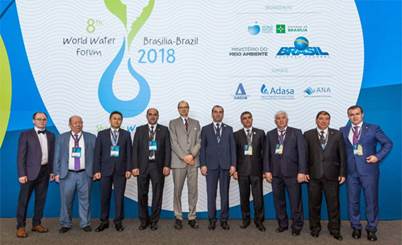From 17 to 23 March, 2018, the 8th World Water Forum was held in Brazil under the general theme of "Water Sharing". More than 100 thousand representatives of government bodies, the scientific community and the public from 172 countries took part in the work of the Forum. 74 thousand people visited the events of the Public Village and the Fair, and 10.5 thousand people took part in more than 200 sessions organized in the Odyssey Conference Center. During the forum, many events with active involvement of youth were held, in which delegates from CACENA countries also took part. GWP CACENA contributed to active involvement of partners from Central Asia and Caucasus into activities of the 8th World Water Forum.
CACENA region at the forum was represented by big number of delegations. From Azerbaijan - International Eurasia Press Fund which is an international organization registered in Azerbaijan. Kazakhstan delegation was leaded by Ambassador of Kazakhstan in Brazil, Mr. Sarzhanov. Kyrgyz Republic was represented by General Director of Water Resources Department, Mr. Tashtanaliev. Big delegation from Tajikistan was leaded by Minister of Energy and Water Resources Mr. Usmonzoda and his deputy Mr. Sulton Rakhimzoda. Uzbekistan delegation was leaded by Minister of Water Resources Mr. Shavkat Khamraev. Turkmenistan was represented by Deputy Minister of Agriculture and Water Resources Mr. Begench Mommadov. There also was big delegation of the International Fund for the Aral Sea Saving leaded by Chairman of EC IFAS Mr. Guzgeldy Bayjanov.
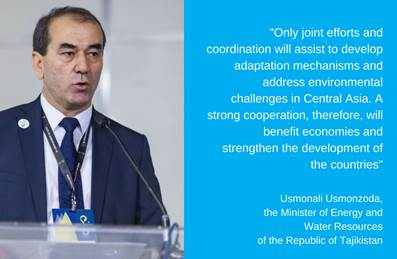 The 1st Meeting of the International Steering Committee of the Dushanbe International High-Level Conference on International Decade for Action “Water for Sustainable Development”, 2018-2028 was held on March 18 in Brasilia. The meeting was chaired by the First Deputy Minister of Energy and Water Resources of the Republic of Tajikistan Mr. Sulton Rakhimzoda, who is the co-chairman of this Committee by the Tajik side.
The 1st Meeting of the International Steering Committee of the Dushanbe International High-Level Conference on International Decade for Action “Water for Sustainable Development”, 2018-2028 was held on March 18 in Brasilia. The meeting was chaired by the First Deputy Minister of Energy and Water Resources of the Republic of Tajikistan Mr. Sulton Rakhimzoda, who is the co-chairman of this Committee by the Tajik side.
On March 19-20, the Ministerial Conference was held, where the Minister of Energy and Water Resources of Tajikistan Usmonzoda, Minister of Water Resources of Uzbekistan Khamraev, and Director General of the Department of Water Resources and Land Reclamation of Kyrgyzstan Tashtanaliev made a speech with official national statements. Speakers reported on the ongoing work in their countries related to water resources management, as well as on the challenges, including in the field of interstate cooperation.
On March 21, 2018, a side event was held on the theme: "Transboundary water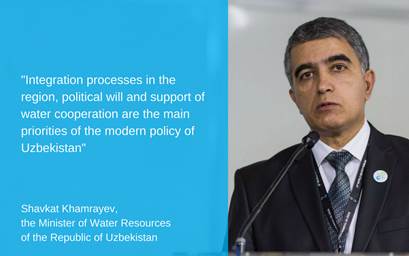 cooperation for food, energy and environmental security in Central Asia". The event was organized by the Regional Environmental Center for Central Asia (CAREC) in cooperation with the International Fund for Saving the Aral Sea (IFAS), the Scientific Information Center of the Interstate Coordination Water Commission of Central Asia (SIC ICWC) and the Swiss Agency for Development and Cooperation (SDC).
cooperation for food, energy and environmental security in Central Asia". The event was organized by the Regional Environmental Center for Central Asia (CAREC) in cooperation with the International Fund for Saving the Aral Sea (IFAS), the Scientific Information Center of the Interstate Coordination Water Commission of Central Asia (SIC ICWC) and the Swiss Agency for Development and Cooperation (SDC).
At the event, Kazakhstan's Ambassador to Brazil Sarzhanov, Minister of Energy and Water Resources of Tajikistan Usmonzoda, Minister of Water Resources of Uzbekistan Khamraev, the Vice-director of the SDC Vennubst P., Chairman of the IFAS Executive Committee Bayjanov G., Deputy Minister of Agriculture and Water Management of Turkmenistan Mommadov B., Deputy Director of SIC ICWC of Central Asia Ziganshina and Yakubov from the CAREC. Director of the Department of Water Resources and Reclamation of the Ministry of Agriculture, Food Industry and Melioration of Kyrgyzstan Kokumbek Tashtanaliev, Director of the Executive Directorate of IFAS in Kazakhstan Bolat Bekniyaz, Director of the Agency of the IFAS in Uzbekistan Vadim Sokolov, the representatives of the countries in the Executive Committee of IFAS and the delegation of Uzbekistan also took part in the session.
The participants of the event stressed the importance of adopting joint constructive approaches in the management of water resources and solving environmental problems related to water. Representatives of the Central Asian states focused on the need to exchange experience and learn about best practices in the field of joint use of water resources, attract investment, develop ecosystems, introduce new approaches to intersectoral coordination, improve the efficiency of water use in various sectors of the economy, expand the scientific and analytical base on water resources management, improvement of legal and institutional mechanisms.
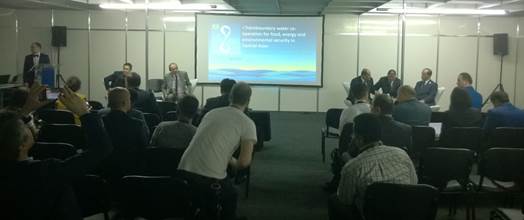
Particular emphasisin the discussion was made on the activation of joint efforts to solve the general planetary problem of drying up the Aral Sea.
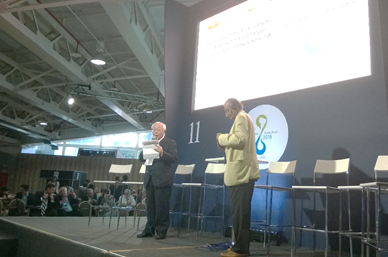 On 21 March there was held session of the Asia-Pacific Water Forum “Upscale Innovation for a water-secure Asia and the Pacific: Synthesis of Asia-Pacific Regional Process”. The objective of this session was to discuss how to implement the “Yangon Declaration: Pathway Forward,” which was adopted at the 3rd Asia-Pacific Water Summit (3rd APWS) in December 2017. It introduced the background of the Summit and its “Call for Actions” by showcasing ways to deliver and scale-up through the discussion of good practices from Asia and the Pacific. It then discussed the opportunities and barriers to implement these policies and measures in the different sub-regions (including CACENA). It also discussed how to gear up efforts and foster more leadership, capability and innovation in policy, institutions and education. Finally, it has examined ways to stimulate funding and collaborative actions by government, the private sector, civil society and local cross-sector partnerships in the Asia-Pacific region to achieve Water Security for Sustainable Development. GWP CACENA Regional Coordinator Vadim Sokolov contributed to this session as panelist and presented outcomes of the CACENA sub-regional process.
On 21 March there was held session of the Asia-Pacific Water Forum “Upscale Innovation for a water-secure Asia and the Pacific: Synthesis of Asia-Pacific Regional Process”. The objective of this session was to discuss how to implement the “Yangon Declaration: Pathway Forward,” which was adopted at the 3rd Asia-Pacific Water Summit (3rd APWS) in December 2017. It introduced the background of the Summit and its “Call for Actions” by showcasing ways to deliver and scale-up through the discussion of good practices from Asia and the Pacific. It then discussed the opportunities and barriers to implement these policies and measures in the different sub-regions (including CACENA). It also discussed how to gear up efforts and foster more leadership, capability and innovation in policy, institutions and education. Finally, it has examined ways to stimulate funding and collaborative actions by government, the private sector, civil society and local cross-sector partnerships in the Asia-Pacific region to achieve Water Security for Sustainable Development. GWP CACENA Regional Coordinator Vadim Sokolov contributed to this session as panelist and presented outcomes of the CACENA sub-regional process.
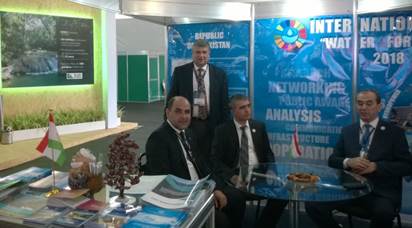 At the Fair and Expo of the 8th WWF also featured a stand of Tajikistan dedicated to the International Decade of Water for Sustainable Development 2018-2028.
At the Fair and Expo of the 8th WWF also featured a stand of Tajikistan dedicated to the International Decade of Water for Sustainable Development 2018-2028.
On 22 March there was held a Session: “Water-Food-Energy-Ecosystems Nexus as a Tool towards SDGs in the CACENA Countries”. The main goal of the CACENA Sub-Regional Process towards the 8th World Water Forum was to support implementation framework towards water targets under the SDGs, which will be conducted by all nine countries under umbrella of the Global Water Partnership network using Nexus approach as practical tool. To meet the goal it is necessary to improve the inter-resource linkages by the step-by-step inventory build-up in the flow of each sector/resource and the nexus mechanism through which the efficiency and synergy could be achieved.
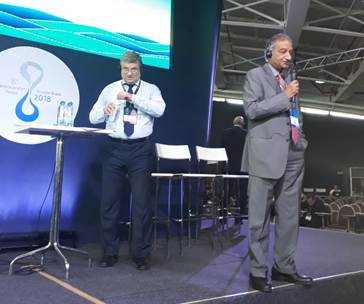 Dr. Ravi Narayanan, Chaiman of the APWF Board welcomed participant of this session.
Dr. Ravi Narayanan, Chaiman of the APWF Board welcomed participant of this session.
During the regional process, there were analysed the three case studies of the Nexus approach application, which was suggested by different strategic partners of GWP CACENA (UNECE and AWC):
- for Caucasus sub-region - the Alazani/Ganikh river basin (UNECE);
- for Central Asia - the Syrdarya river basin (UNECE), and
- for Mongolia (Asia Water Council).
The nexus assessment of the Alazani/Ganykh Basin aims to support transboundary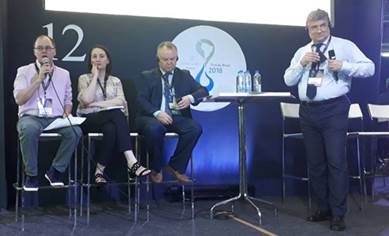 cooperation between Georgia and Azerbaijan in the areas of water, energy, food and environmental policies by strengthening the knowledge base for integrated policy development and decision-making.
cooperation between Georgia and Azerbaijan in the areas of water, energy, food and environmental policies by strengthening the knowledge base for integrated policy development and decision-making.
The specific objectives of this nexus assessment are:
- to describe the governance context;
- to identify key drivers of pressure on the basin’s resources;
- to identify and analyze key intersectoral issues;
- to explore the potential solutions to increase the benefits provided by the management of the basins resources that could be achieved through more coordinated policies and actions, and through transboundary cooperation; and
- to identify the benefits that the adoption of a nexus approach can potentially deliver.
The Syrdarya’s basin resources play a key role in the economy and development of four riparian countries: Kyrgyzstan, Tajikistan, Uzbekistan and Kazakhstan. The basin provides fertile agricultural land, water resources that support hydropower generation and irrigated agriculture, and some of the world’s largest oil, coal and natural gas reserves.
Objectives of the case study in Mongolia: Evaluate the current water management practices of Mongolia and recommend implementation plan to raise up the efficiency based on WEF nexus approach:
- Evaluate and make recommendation to the Mongolian water management plan based on the National Water Program until 2030, linking with the international development agendas (SDGs and Paris Declaration).
- Assessment of current status of Water, Energy, and Food Sector in Mongolia
- Feasibility of the proposed water program reflecting the changing environment
- Suggestion of efficient management for Water, Energy and Food
- Understand the legal, regulatory and institutional framework related to water policy and development planning of Mongolia
The lessons learned from case studies presented at the session: Water-Energy-Food-Ecosystems Nexus could be innovative concepts and tough trade-offs will increasingly be needed between energy, climate, food and water in terms of resource allocation, planning and long term sustainable growth that accommodates those at the bottom of the economic pyramid. Climate change, environment, economy, and policy/regulation also play an important role for the nexus as external factors.
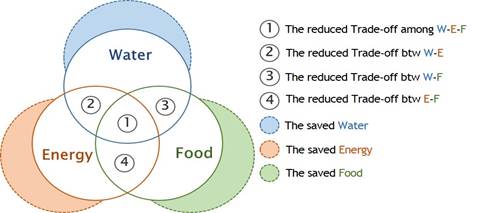
Those activities could address water related problems in each regional country while achieving global SDGs and all other goals. The results of the case studies could serve as an example and be duplicated in other countries by GWP CACENA.
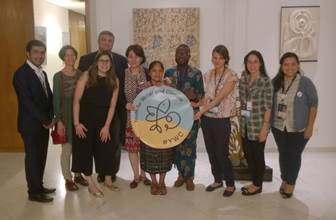 On 20 March, evening join event GWP and the Embassy of Austria in Brazil was held to celebrating the ways multi-stakeholder partnerships to advancing water security. Welcome and introduction was done by Dr. Irene Giner-Reichl, Ambassador, Embassy of Austria Brasília and by Dr. Oyun Sanjaasuren, Chair, Global Water Partnership
On 20 March, evening join event GWP and the Embassy of Austria in Brazil was held to celebrating the ways multi-stakeholder partnerships to advancing water security. Welcome and introduction was done by Dr. Irene Giner-Reichl, Ambassador, Embassy of Austria Brasília and by Dr. Oyun Sanjaasuren, Chair, Global Water Partnership
This event highlighted the unique value-add of MSPs for accelerating action. 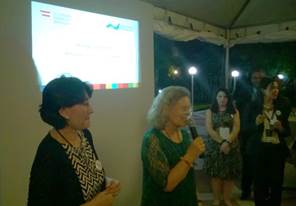 Representatives from a diverse set of partner organizations from GWP family shared stories of how MSPs around the world are working to tackle water challenges.
Representatives from a diverse set of partner organizations from GWP family shared stories of how MSPs around the world are working to tackle water challenges.
Main outcomes for CACENA region from the 8th World Water Forum:
The Forum participants were acquainted with the ongoing activities in CACENA region in water resources management and their effective use, and the CACENA's adherence to international legal norms, in particular the UNECE Convention in the joint use of the shared water resources of the Central Asian and Caucasus sub-regions.
The Forum participants were familiarized with the structural reforms in the CACENA countries in the field of water resources management and their effective use in various sectors of the economy with the fundamental goal of increasing the well-being of the population in the CACENA region.
The attention of the participants of the Forum was involved in strengthening joint actions to address the Aral Sea problems and improve the Aral Sea zone by mobilizing the funds of the international community by participating in the multi-partner trust fund for human security in the Aral Sea region created in Uzbekistan under the auspices of the United Nations.
GWP CACENA assisted to delegations to communicate with the representatives of donor organizations, in particular representatives of the UN-Water, Swiss Agency for International Cooperation, the World Bank and ADB. There were discussed the implementation of a number of joint projects in the field of improving the management of water resources and their use in the CACENA countries, as well as further development of cooperation within the GWP family.
